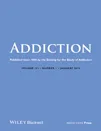| Titre : | Adolescent cannabis use and repeated voluntary unprotected sex in women (2016) |
| Auteurs : | A. AGRAWAL ; L. FEW ; E. C. NELSON ; A. DEUTSCH ; J. D. GRANT ; K. K. BUCHOLZ ; P. A. F. MADDEN ; A. C. HEATH ; M. T. LYNSKEY |
| Type de document : | Article : Périodique |
| Dans : | Addiction (Vol.111, n°11, November 2016) |
| Article en page(s) : | 2012-2020 |
| Langues: | Anglais |
| Discipline : | EPI (Epidémiologie / Epidemiology) |
| Mots-clés : |
Thésaurus géographique ETATS-UNISThésaurus mots-clés FRATRIE ; SEXUALITE ; PRESERVATIF ; CONDUITE A RISQUE ; ADOLESCENT ; CANNABIS ; SEXE FEMININ ; FACTEUR PREDICTIF ; GENETIQUE ; INITIATION ; AGE |
| Résumé : |
Background and aims: Substance use has been implicated in the onset and maintenance of risky sexual behaviors, which have particularly devastating consequences in young women. This study examined whether (i) adolescent onset of cannabis use is associated with repeated voluntary unprotected sex in women and (ii) whether this association persists after accounting for correlated familial influences.
Design: General population sample of female twins. Setting: Midwestern United States. Participants: A total of 2784 sexually active twin women (15.5% African American) aged 18-27 years (assessed 2002-05), including 119 dizygotic (DZ) and 115 monozygotic (MZ) discordant pairs. Measurements: Self-report interview data on cannabis use that first occurred prior to age 17 (27.1%) and repeated voluntary unprotected sex (27.2%). Key covariates included early onset of regular drinking, regular smoking, sexual debut and menstruation as well as conduct disorder symptoms and childhood sexual abuse. Findings: Compared with never users and those who started using cannabis at a later age, adolescent cannabis users were more likely to report repeated voluntary unprotected sex [odds ratio (OR) = 2.69; 95% confidence interval (CI) = 2.24-3.22]. Genetic (rg = 0.57, 95% CI = 0.38-0.87) and non-shared environmental (re = 0.21, 95% CI = 0.02-0.38) factors contributed to the association. After accounting for correlated familial factors, there was a consistent elevation in the likelihood of repeated voluntary unprotected sex in the exposed twin relative to her genetically identical never/late-onset user co-twin (unadjusted OR = 2.25, 95% CI = 1.14-4.44), even after adjustment for covariates (adjusted OR = 2.27, 95% CI = 1.08-4.80). Conclusions: Women who start using cannabis during adolescence appear to be more likely to report voluntary engagement in repeated unprotected sex than women who never use cannabis or who initiate cannabis use after adolescence. The results appear to be independent of shared genetic influences. |
| Domaine : | Drogues illicites / Illicit drugs |
| Refs biblio. : | 45 |
| Affiliation : | Washington University School of Medicine, Department of Psychiatry, Saint Louis, MO, USA |
| Cote : | Abonnement |
 Accueil
Accueil




